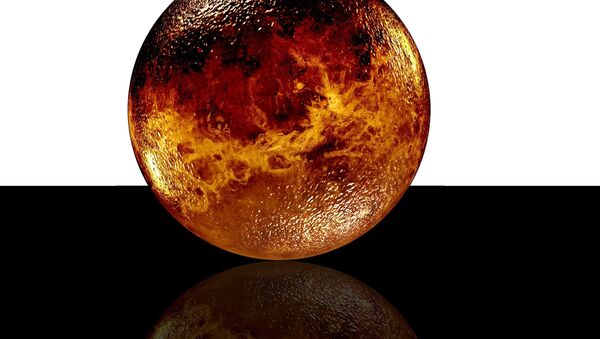Sputnik: Can you tell us in more detail how you noticed the dark patches in the clouds?
Sanjay Limaye*: The patches actually have been known for a long time, more than a century ago, through the telescopes, but back then we did not know how fast Venus spins, people looked at the traces of Mars and they could see surface features and they could see them rotate into and out of view so they could calculate the rotation speed, but Venus was a challenge. The only way they could figure out that it was rotating, was to notice anything in the planet's visible disk that they could track over time, but it took a while before people realized that what they were looking at was not the surface of Venus, but something in the clouds, and that is still a puzzle as to why Venus, a planet which rotates very slowing about itself, it takes 243 days to make one complete rotation, why does it feel so fast.
READ MORE: Mysterious Clouds: Venus' Sky Could Harbor Alien Life — Study
Sputnik: Now that there's a possibility that there could be life on another planet, what are the next steps for the study Professor?
Sanjay Limaye: We haven't really discovered life, only proposed that the conditions there are conducive to life and the properties of the cloud particles that we have measured, they really are not able to differentiate what the composition of the identity of those particles is, all we know is chemical composition, obviously, but it doesn't tell us if there could be microorganisms or they're just particles. We found some terrestrial bacteria which do have some absorbtion features which mimic those found on Venus. So given the things that we know about the cloud particles and the things we don't know, it unclear whether bacteria could survive on Venus and perhaps be responsible for some of the of absorbtion of sunlight.
READ MORE: Venus' Cloud Alien Life Mystery Explained
What we need is laboratory measurements on what kind of bacteria can survive the Venus clouds conditions, the acidic measure, the presence of sulfuric acid, for example, what their spectral properties are, what their situation is like and whether it's compatible with what we might find on Venus in terms of bacteria or microorganisms, and we certainly need to, actually, go there and explore the clouds of Venus by sampling and we need a capable platform — Venus Atmospheric Maneuverable Platform (VAMP) — a cross between a plane and a blimp, if you will. The VAMP aircraft has been conceptualized by some folks and we hope it can survive in the Venus' atmosphere for months, up to a year, it's solarh powered, so power shouldn't be an issue and if it can carry some significant instruments we would be able to sample the clouds and either confirm that there are no bacteria or maybe there's something there that we should look into further.
Sputnik: If some sort of life is found on Venus do you think there's a chance that other planets in our solar system may also be hosting lifeforms?
Sanjay Limaye: Well, we certainly can't exclude the possibility. A lot of attention has been focused on Mars, ever since we heard reports about the discovery of bacterial fossils in a meteorite (from Mars) that were found on Earth, the Allan Hills ALH-84001 meteorite became the most famous meteorite because scientists found fossils that looked like bacteria, that was David McKay and his colleagues sometime in the early 1990's. There is an interest in exploring whether or not there life exists elsewhere, we don't know if life started on Earth or whether it was seeded by stuff coming from outer space, that's a possibility that we can't exclude. If we find life on Venus it will be a huge discovery, and we shouldn't be surprised if we discover life on other planets, possibly Mars, Titan even, that suggests that even the exoplanets around other stars stars which are Earth-like or Venus-like may be able to host life.
*Sanjay Limaye is the coauthor of the Venus study and senior scientist at the Space Science and Engineering Center, the University of Wisconsin-Madison.
The views of the speaker do not necessarily reflect those os Sputnik.



